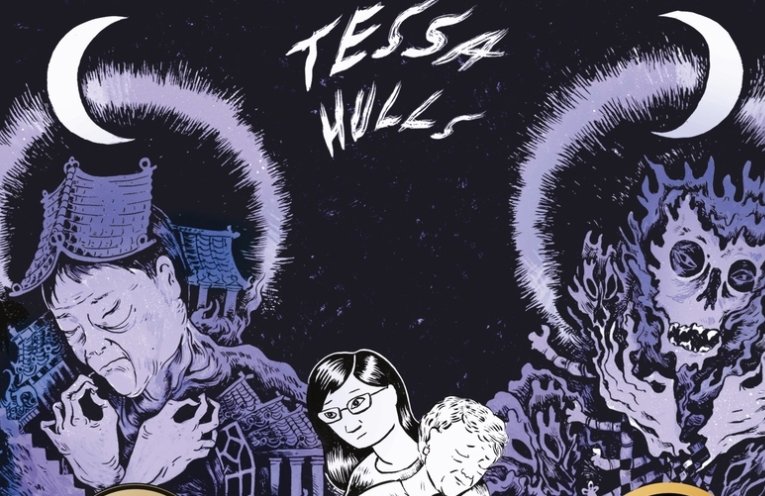After a lifetime of running away, Tessa Hulls wrote and illustrated her way home. Feeding Ghosts, her graphic memoir, tells the intimate story of three generations of women: her Chinese grandmother Sun Yi, her mother Rose, and Tessa herself. Hulls was awarded this year’s Pulitzer for memoir, only the second graphic novel to win the prize; the first was Art Spiegelman’s Maus in 1992.

Today Hulls divides her time between Seattle and Alaska (she’s presently in Juneau working as a sous chef for the Alaska state legislature). She spent nearly a decade working on her story.
She starts and ends her memoir picturing and recalling a train trip she and her mother took in 2016. Their Hong-Kong-to-Shanghai journey retraced in reverse the route that Tessa’s grandmother and daughter had taken when they fled Communist China 60 years earlier, escaping via train and then inside the false bottom of a fishing boat.
Years later, Tessa would grow up in a house choked with ghosts, reminders of that dramatic past. Her grandmother Sun Yi had been a journalist in Shanghai, abandoned by a Swiss diplomat when she became pregnant. Once the communists took over, Sun Yi was forced into subjugation, made to write weekly confessions. Afterward, she escaped Shanghai with her seven-year-old daughter Rose and traveled to Hong Kong. Sun Yi wrote a popularly received memoir before slipping into mental illness. Later it was Rose who, after essentially educating herself in a Eurasian boarding school in Hong Kong, took her ailing mother to Northern California where Tessa was born in 1984.
Tessa credits her mother Rose with managing to grow a life around her despite her damaged upbringing. Upon learning that Tessa was becoming both a writer and an artist, Rose became terrified that her daughter would inherit grandmother Sun Yi’s mental illness. To save her from such madness, Tessa would have to be broken.
While her mom doubled down on her psychic mission, Tessa retreated into the feral romance of the Wild West, becoming a cowboy in her mind. She spent her 20s traveling to far-off destinations like Antarctica, the Alaskan tundra, and biking alone in Ghana. She finally began to see her flight less as freedom and more like a different cage. She came to believe that to find peace, she’d have to return home and face her ghosts. Just months past her 30th birthday, she began her emotional expedition into her family’s past. It took Tessa nearly ten years to research and tell the story of her family’s three generations.
She begins the saga in Suzhou, China, where her grandmother was born in 1927 — second of five children, four girls. At the time, girls were considered expensive liabilities, just mouths to be fed. But Sun Yi’s family instead chose to give Rose an education.
Tessa spent time at the Seattle Public Library researching Chinese history. She also studied the library’s vast collection of graphic novels, and she traveled to China to enroll in Mandarin classes. She spent six months in an off-the-grid cabin in Oregon, developing a 10,000-word outline for her story.
Tessa creates the book’s 400 pages of meticulously drawn panels, picturing her work routine, ever clutching a spiral notepad (so like her grandmother’s reporter’s pad). She draws her own desk showing the animal-shaped pen and brush holders. Her pages flow across restless and turbulent waters, heavily punctuated with text, alive with dialogue and thoughts.
After her graphic memoir debuted March 5, 2024, Hulls traveled across the country on an eight-month book tour. She told The Seattle Times reviewer that, while she disliked the isolation of producing her book, she was “born to go on a book tour,” an adventurer traversing the country. The surprise Pulitzer announcement came just as the paperback version of Feeding Ghosts was coming out but, alas, it also arrived just as Tessa’s mother was slipping into dementia.
Hulls’s story, more than a print autobiography, has an aura of intimacy and an uncommon talent for staying with the reader. You can see the spare and evocative drawings in your mind long after you’ve reached Hulls’s conclusion that, “much as you may try, escape can never be a home.”
Tessa Hulls’s extraordinary effort takes readers along on her trip. After spending nearly ten years on Feeding Ghosts, she insists it will be her first and only book — one and done. She came to that self-assigned task to heal her relationship with her mother and succeeded. Hulls leaves the reader stunned, realizing that a family is fundamentally a shared story.
